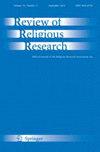极端东正教无宗教信仰者在医疗保健系统中面临的障碍
IF 1.7
1区 哲学
0 RELIGION
引用次数: 0
摘要
与移民类似,许多无宗教信仰的人在健康方面也很脆弱。然而,很少有研究涉及他们使用医疗保健系统的能力。本文通过研究以色列犹太极端东正教无宗教信仰者的案例,填补了这一空白。研究分析了阻碍这些无党派人士使用医疗保健系统的障碍,这些障碍对他们的健康产生了不利影响。这项研究基于对 36 名极端东正教无党派人士进行的半结构式深度访谈,并采用定性主题分析法进行了分析。研究发现了六大障碍:缺乏与健康相关的教育和对医疗系统的了解、贫困和健康的结构性决定因素、不尊重权威、沟通障碍、缺乏归属感、污名化,尤其是心理健康方面的污名化。我们建议对医疗服务提供者和学生进行培训,以便他们在为无党派人士提供医疗服务时更好地理解和解决这些障碍以及无党派人士的独特需求。具体来说,我们建议将这一被忽视的主题纳入文化能力和结构能力框架,鼓励医疗从业人员与无宗教信仰者合作,以促进公平和包容性政策。对社区组织的影响包括为无宗教信仰者提供与健康相关问题的课程、模拟、同伴指导和咨询,以及让无宗教信仰者参与自我辩护。我们建议这项研究适用于世界各地各种孤僻、紧张的宗教团体中的无党派人士。本文章由计算机程序翻译,如有差异,请以英文原文为准。
Barriers to the Healthcare System Faced by Ultra-Orthodox Religious Disaffiliates
Many religious disaffiliates, similar to immigrants, experience health vulnerabilities. Yet, few studies address their ability to access the healthcare system. This article contributes to filling this void by examining the case of Israeli Jewish ultra-Orthodox disaffiliates. The study analyzes the barriers that hinder these disaffiliates’ access to the healthcare system, adversely affecting their well-being. This research is based on 36 in-depth, semi-structured interviews with ultra-Orthodox disaffiliates, analyzed using qualitative thematic analysis. Six barriers were identified: lack of health-related education and knowledge of the healthcare system, poverty and structural determinants of health, lack of respect for authority, communication gaps, lack of belonging, and stigmas, particularly in mental health. We recommend training healthcare providers and students to better understand and address these barriers and disaffiliates’ unique needs when providing care for them. Specifically, we suggest incorporating this overlooked subject in the frameworks of cultural competency and structural competency, encouraging collaboration between healthcare practitioners and religious disaffiliates to promote equitable and inclusive policies. Implications for community organizations include offering courses, simulations, peer guidance, and consultation for disaffiliates on health-related issues, as well as engaging disaffiliates in self-advocacy. We propose that this study is relevant to disaffiliates from varied insular, high-tension religious communities worldwide.
求助全文
通过发布文献求助,成功后即可免费获取论文全文。
去求助
来源期刊

Review of Religious Research
Multiple-
CiteScore
2.50
自引率
20.00%
发文量
31
期刊介绍:
The Review of Religious Research (RRR) publishes empirical social science research on religion, primarily in sociology and social psychology and related fields of psychology, and scholarly literature reviews of research in these fields. RRR provides a forum for research across multiple disciplines and approaches, including research on the following topical areas: Clergy; Church programs; Comparative analyses of religious denominations and institutions; Denominational and congregational growth, decline, and vitality; Denominational and congregational conflict, competition, and cooperation; Ethnicity/race and religion; Generational and personal religious change; New religious movements; Personal spiritual and religious beliefs and practices; Religion and attitudes; Religion and family; Religion and gender, Religion and social behavior; Religion and well-being; and Research methodology. Among the characteristics that distinguish RRR from other academic journals on the study of religion are its applied focus and the opportunities it offers for academics and denomination-based researchers to share their findings with each other. RRR aims to facilitate the sharing and comparing of applied studies between denominational and academic researchers. RRR is the official quarterly journal of the Religious Research Association, Inc. RRR regularly publishes Original Articles, Research Notes, Review Articles, Applied Research Abstracts, and Book Reviews, and occasionally publishes articles on the Context of Religious Research. Applied Research Abstracts: This type of publication (previously called Denominational Research Reports) consists of a 350-550 word summary (without any references) of an applied research study in the form of a structured abstract, with the following section headings: Background, Purpose, Methods, Results, and Conclusions and Implications, followed by 3-4 keywords. The author may included a footnote that states: (a) whether a complete report exists and how it can be obtained; (b) whether the raw data are available in electronic form and how they can be obtained if the authors wish to make them available to other researchers; and (c) whether the authors would like to collaborate with other researchers to further analyze the data and write a full report for possible journal publication as a peer-reviewed manuscript. Such abstracts should be submitted to the journal editor for consideration for publication. Book Reviews: Unsolicited book reviews are not accepted for publication in RRR. If you would like to review a book for the journal, contact the Book Review Editor, David Eagle, Ph.D. – david.eagle@duke.edu Context of Religious Research: This journal heading covers items about awards and announcements, memoriams, and articles about the research process (e.g., articles on research methods and statistics, and profiles of denominational research organizations), as well as invited addresses to the Religious Research Association. Unsolicited articles should be submitted to the journal editor for consideration for publication. Original Articles: These are scholarly and methodologically sophisticated research studies: see Information for Authors on this website and the Submission Guidelines on the Springer RRR website for details (https://www.springer.com/13644) Reseach Notes: These are scholarly and methodologically sophisticated research studies: see Information for Authors on this website and the Submission Guidelines on the Springer RRR website for details (https://www.springer.com/13644) Review Articles: Authors should send an email to the journal’s editor describing the nature and scope of a proposed literature review to see if it is suitable for publication in RRR. See Information for Authors on this website and the Submission Guidelines on the Springer RRR website for details (https://www.springer.com/13644) The journal’s editor is Kevin J. Flannelly, Ph.D. – kjflannelly@gmail.com
 求助内容:
求助内容: 应助结果提醒方式:
应助结果提醒方式:


